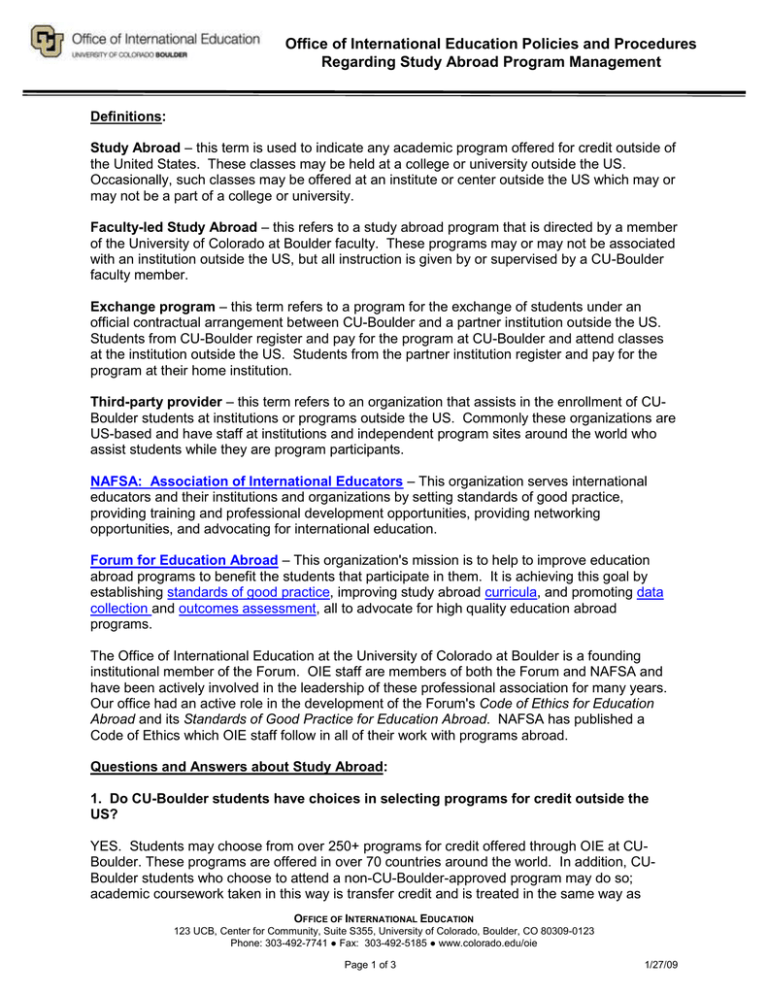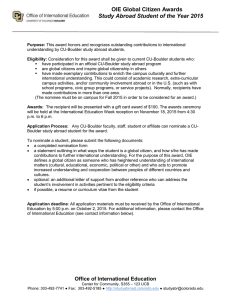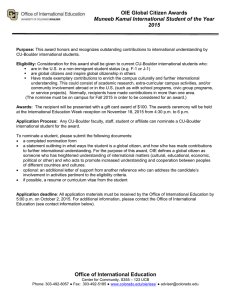Office of International Education Policies and Procedures
advertisement

Office of International Education Policies and Procedures Regarding Study Abroad Program Management Definitions: Study Abroad – this term is used to indicate any academic program offered for credit outside of the United States. These classes may be held at a college or university outside the US. Occasionally, such classes may be offered at an institute or center outside the US which may or may not be a part of a college or university. Faculty-led Study Abroad – this refers to a study abroad program that is directed by a member of the University of Colorado at Boulder faculty. These programs may or may not be associated with an institution outside the US, but all instruction is given by or supervised by a CU-Boulder faculty member. Exchange program – this term refers to a program for the exchange of students under an official contractual arrangement between CU-Boulder and a partner institution outside the US. Students from CU-Boulder register and pay for the program at CU-Boulder and attend classes at the institution outside the US. Students from the partner institution register and pay for the program at their home institution. Third-party provider – this term refers to an organization that assists in the enrollment of CUBoulder students at institutions or programs outside the US. Commonly these organizations are US-based and have staff at institutions and independent program sites around the world who assist students while they are program participants. NAFSA: Association of International Educators – This organization serves international educators and their institutions and organizations by setting standards of good practice, providing training and professional development opportunities, providing networking opportunities, and advocating for international education. Forum for Education Abroad – This organization's mission is to help to improve education abroad programs to benefit the students that participate in them. It is achieving this goal by establishing standards of good practice, improving study abroad curricula, and promoting data collection and outcomes assessment, all to advocate for high quality education abroad programs. The Office of International Education at the University of Colorado at Boulder is a founding institutional member of the Forum. OIE staff are members of both the Forum and NAFSA and have been actively involved in the leadership of these professional association for many years. Our office had an active role in the development of the Forum's Code of Ethics for Education Abroad and its Standards of Good Practice for Education Abroad. NAFSA has published a Code of Ethics which OIE staff follow in all of their work with programs abroad. Questions and Answers about Study Abroad: 1. Do CU-Boulder students have choices in selecting programs for credit outside the US? YES. Students may choose from over 250+ programs for credit offered through OIE at CUBoulder. These programs are offered in over 70 countries around the world. In addition, CUBoulder students who choose to attend a non-CU-Boulder-approved program may do so; academic coursework taken in this way is transfer credit and is treated in the same way as OFFICE OF INTERNATIONAL EDUCATION 123 UCB, Center for Community, Suite S355, University of Colorado, Boulder, CO 80309-0123 Phone: 303-492-7741 ● Fax: 303-492-5185 ● www.colorado.edu/oie Page 1 of 3 1/27/09 Office of International Education Policies and Procedures Regarding Study Abroad Program Management credit earned at any other college or university. Credit from official CU-Boulder study abroad programs is 'in-residence' credit while transfer credit is not. 2. Is there a process for approval of CU-Boulder study abroad programs? YES. The first step in this process is a screening by the CU-Boulder Study Abroad Committee (SAC). This committee is comprised of CU-Boulder faculty, staff, and students who review the academic, logistical, and financial aspects of the program. There are also on-going, periodic reviews of programs by the SAC and OIE. Contracts for these programs are reviewed by University Counsel and the CU Procurement Services Office in order to ensure that they comply with state and university contracting guidelines. 3. Are exchange programs reviewed and approved in the same way as one-way study abroad programs? YES. Exchange program are programs in which we send study abroad students to a host institution and receive incoming exchange students from that same institution. Exchanges must be approved by OIE and the SAC. All exchange programs involve contracts between CUBoulder and the institution outside the US. These contracts are approved by University Counsel, but are not managed through CU Procurement Services since there is no money exchanged between the institutions. (Each student pays their home institution and then attends the host institution in place of a student from that institution.) 4. Can CU-Boulder guarantee students admission to the program that they want? Not in every case. Programs have eligibility requirements that must be met, and some programs have limited enrollment and are therefore competitive. CU-Boulder strives to offer a variety of programs to meet the needs of its students; when admission to limited enrollment programs closes, the OIE staff work with students who meet admission criteria to assist them in finding an alternative program. Programs are regularly added based on student and faculty demand, but the selection of approved programs cannot accommodate everyone’s wishes. In addition, because they are extremely labor intensive, exchange programs are limited in number. 5. Does CU-Boulder receive discounts or rebates from program providers? YES. Under the terms of contracts with providers CU-Boulder does receive some discounts (rebates) or payments from some providers. 100% of money received under such a contract is returned to students in the form of scholarships or fee reductions. Neither CU-Boulder nor OIE charges a fee to process any of this funding. All money received under such an arrangement is passed on directly to students. It should be noted that there are no individual incentive arrangements with any outsider vendor for OIE staff. 6. Does OIE have any Memos of Understanding (MOU's) or contractual arrangements to manage enrollments at institutions outside of the US? YES. All such MOU's and contracts adhere to state purchasing requirements and are reviewed by University Counsel. All such arrangements are reviewed on a periodic based to ensure compliance with current regulations. OFFICE OF INTERNATIONAL EDUCATION 123 UCB, Center for Community, Suite S355, University of Colorado, Boulder, CO 80309-0123 Phone: 303-492-7741 ● Fax: 303-492-5185 ● www.colorado.edu/oie Page 2 of 3 1/27/09 Office of International Education Policies and Procedures Regarding Study Abroad Program Management 7. How are “third-party providers” chosen? The CU-Boulder SAC reviews all arrangements for programs outside of the US. This group reviews both academic and logistical arrangements. University Counsel and the CU Procurement Services Center reviews contractual arrangements. There is an on-going process of review for providers to ensure that our students receive quality academic programming, a variety in the structure of program offerings, and the best financial arrangements . 8. Do you accept inducements from providers? Neither OIE nor any of its staff accepts payments or gifts from providers that violate State of Colorado or University of Colorado ethical standards. The restrictions of Amendment 41 of the Colorado Constitution are followed in this regard. 9. Are site visits done by OIE staff? YES. Review and evaluation visits of program locations outside the US are a regular and necessary part of program review. Any such visit must be approved by the Director of OIE. These visits are done as a part of OIE’s Strategic Plan for Site Visits and this plan is reviewed annually to ensure visits meet a programmatic need. To be approved, a visit requires a clear statement of need, an evaluation of what expenses will be paid by whom, and adhere to state fiscal policy. A report of the visit is shared with OIE staff and may be shared with others as appropriate. 10. Do OIE staff serve on advisory boards outside CU-Boulder? YES. Service on advisory boards of other organizations is an expected service to the profession and provides important knowledge and connections for CU-Boulder. OIE staff service on boards requires the approval of the Director of OIE and a clear statement of the role of the individual on that board. Regular reports of board activities are shared with other OIE staff and the SAC where appropriate. No remuneration is ever provided for such service except for the reimbursement for actual expenses involved in participating in board functions. 11. Do OIE staff receive incentives for marketing certain programs to students? Neither OIE nor any of its staff receive any financial incentives from any outside source to market specific programs. At the present time, OIE is at workload capacity and only undertakes campus marketing to ensure broad dissemination of its information to the CU student body. No incentives of any kind are received by individual staff members. 12. Does OIE receive “back office services to defray operating expenses”? NO. Neither OIE nor CU-Boulder receive any operating expense money from any study abroad provider with whom we do business. The funding of our operating expenses comes from fees that are charged to students who participate in study abroad programs. These fees are approved through normal CU processes and these funds are subject to CU accounting rules and, when necessary, subject to CU and/or state audits. OFFICE OF INTERNATIONAL EDUCATION 123 UCB, Center for Community, Suite S355, University of Colorado, Boulder, CO 80309-0123 Phone: 303-492-7741 ● Fax: 303-492-5185 ● www.colorado.edu/oie Page 3 of 3 1/27/09


